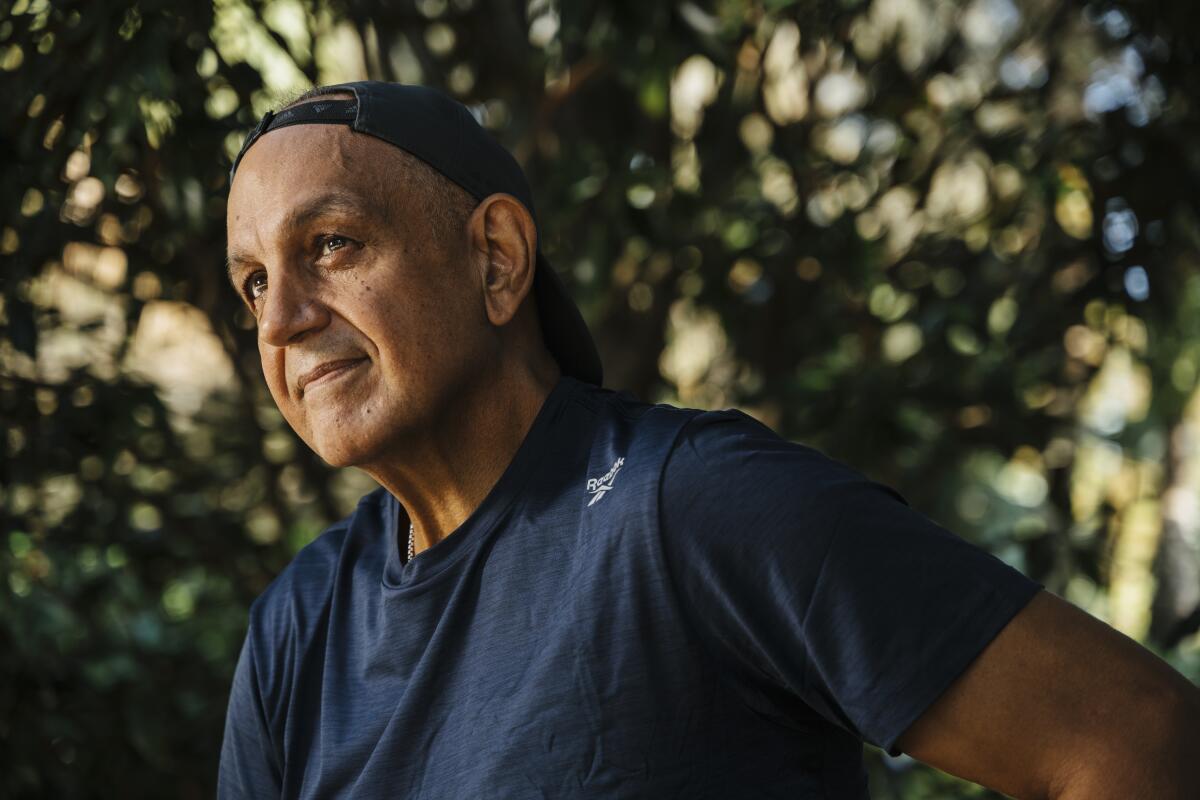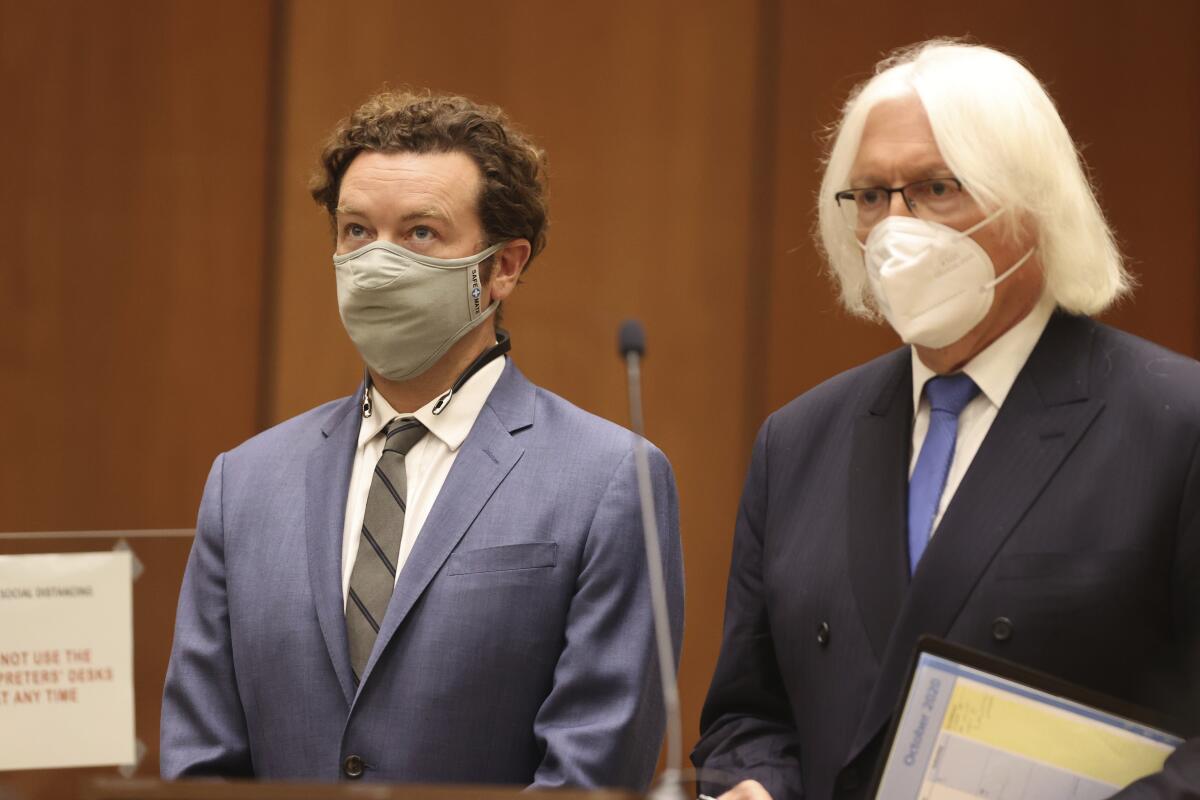Masterson’s accusers feared being kicked out of Scientology. His stepfather lived it

Each day at Danny Masterson’s rape trial, the front two rows in the downtown Los Angeles courtroom are filled with the actor’s family and close friends.
Like Masterson, his mother, Carol; his wife, the actress Bijou Phillips; his brothers and two half siblings, and his friend Chris Wadhams are devout Scientologists. They’ve listened without reaction to graphic testimony by Masterson’s accusers, chatting quietly with him during breaks and leaving court with him at the end of each day.
Not among them is a man who helped raise Masterson and his siblings, his former stepfather, Joe Reaiche. Excommunicated from Scientology in 2005, the former professional Australian rugby player said neither Masterson nor any other members of the family have spoken to him since.
“When it happened, I cried. It’s my kids. I raised my children and now they’ve turned against their dad,” Reaiche said in an interview with The Times. “Not because of my decision, but because of the church’s decision. That’s the evil of disconnection.”
The “it,” Reaiche said, was the decision by church officials to declare him a “suppressive person” — a designation that expelled him from the religion and required other Scientologists to cut ties with him.

The concept hangs over the Masterson trial. In a pretrial ruling that set out how much jurors would hear of the church’s inner workings, the judge allowed the prosecution to cite the religion’s policy on declaring followers as suppressive to help explain why the accusers, who were raised as Scientologists, waited long periods of time before reporting Masterson to police.
Masterson is accused of raping three women between 2001 and 2003. The women allege he plied them with alcohol before assaulting them and sometimes attacked them while they were unconscious. Representatives from Scientology, they’ve said, pressured them not to report the crimes to the police.
The two women who have taken the stand in the trial so far said they avoided going to law enforcement out of fear of being labeled suppressive.
“That’s significant for a member of the church,” Deputy Dist. Atty Reinhold Mueller told jurors in his opening statement about the concept of “being declared.”
“What that means is the church and members of the church have to detach from you. You are essentially an enemy of the church. Your friends, your parents ... they all have to detach from you.”
The Church of Scientology told The Times the practice of declaring followers suppressive is “very rare.” The church also says it has no policy requiring Scientologists to stop talking with someone after they are found to be suppressive.
Declaring people suppressive is “no different than the practices of disfellowship, excommunication and shunning, practiced by other religions when one member of a group engages in unethical conduct which is damaging to the group as a whole,” Scientology spokeswoman Karin Pouw said.
For Reaiche, the ejection was swift and done even before the church informed him of its decision, he said.
“I called some of my buddies of 20, 25 years. No one responds. That’s weird. I call my kids. No one responds,” he said.
The next day he received the letter.
“They let everyone else know that I was declared except me,” Reaiche recalled. “All of a sudden, overnight, it’s like they all died.”
Her fear of suffering that fate led Jen B., one of Masterson’s accusers, to wait a year to report her rape to the Los Angeles Police Department, she testified. Like the other accusers, the woman is being identified in court records and during testimony by her first name and last initial to protect her privacy.
As a second-generation Scientologist, Jen B. said, she thought her friends and parents would disown her if she reported Masterson.
“I was a Scientologist and Mr. Masterson is a Scientologist and you cannot report another Scientologist in good standing to the authorities,” she testified. “My understanding is I would immediately be guilty of a ‘high crime.’ High crime comes with the penalty of expulsion from Scientology. … You cannot speak, have contact, anything with a person who has been expelled. Declared a suppressive person is the label I would receive.”
Jen B. wrote a letter in April 2004 to Mike Ellis, the church’s international justice chief.
“I am writing to you for help. I would like permission to file criminal charges and civil suit [against Masterson] if I feel I am up to it and not fear being declared,” she wrote, according to the letter, which was used as an exhibit at trial.
In his response, Ellis did not assuage her fears, prosecutors said.
“Mr. Ellis’ response a few days later tells her she needs to review the alternatives and consequences carefully. What that meant to Jen B. was that she could not go to police or she would be declared,” Mueller said in his opening statement.
Pouw said Mueller misrepresented the intent of Ellis’ response. The Church of Scientology denies that people are punished for reporting crimes committed by other Scientologists.
Another accuser, Christina B. — who dated Masterson for six years in the late 1990s and early 2000s — also feared being declared suppressive. She told no one outside the church about the rape for 10 years, prosecutors said. She waited 15 years before reporting it to police.
“If you were to have been declared a suppressive person, what impact would that have had on you?” Mueller asked the woman during her testimony.
“I’m afraid I would not have survived that at the time,” Christina B. replied.
Christina B. left the church in 2016 herself. Her friends who were Scientologists completely disconnected from her, according to her lawsuit filed against the Church of Scientology and Masterson.
Jen B. was declared a suppressive person in 2016 after reporting her rape to police, according to her lawsuit. Pouw denied this.
Reaiche had already been drifting away from the church for years when he was kicked out, he said.
“They were too gung-ho in the church and I was watching from the side,” Reaiche recalled of his family.
He and Carol Masterson divorced in 1995, but he maintained a close relationship with Danny and Chris Masterson — as well as his biological children Jordan and Alanna — and lived in Los Angeles until 2004. He worked as a physical trainer for Danny and Chris Masterson after they secured roles in big Hollywood shows.
Reaiche moved to Atlanta in 2004 and said his ties to the church had grown tenuous, when “all of a sudden I get a phone call and I’m summoned [to Florida] to appear in 24 hours ... before a Committee of Evidence.”
He made the trip to Clearwater, Fla., where the Church of Scientology has its “spiritual headquarters.” In a small room, four church officials spent two late-night hours interrogating him about allegations that he had used Scientology practices and teachings in a “squirrel format” — church lingo for a non-sanctioned manner.
Reaiche said he was training others in a program that was similar to Scientology, but less expensive than what Scientology charges its followers to advance through the various stages of its teachings.
Six months later, Reaiche was declared suppressive. He alleged that the church tried him in a “kangaroo court” and that denying the charges did nothing to help his case.
“In November of 2002 Joe used squirrel ethics tech on a non-Scientologist in order to ‘introduce’ her to Scientology,” officials wrote in the order they issued declaring Reaiche a suppressive person.
For a time, Reaiche sent Christmas cards and birthday cards to his family, but eventually he gave up.
He wishes he could show up to support the family for Masterson’s trial, but knows his presence would make everybody uncomfortable.
“There will be no weddings for me. I don’t know my grandkids. It’s tough. ... But I suck it up,” he said. “Still, that’s my family. To see them in court, it’s not easy. That’s all I’m saying. It’s gotta be tough for them.”
More to Read
Sign up for Essential California
The most important California stories and recommendations in your inbox every morning.
You may occasionally receive promotional content from the Los Angeles Times.










